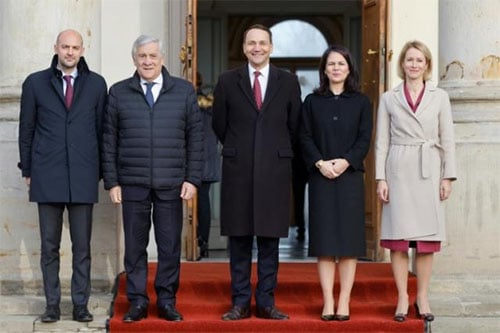
WARSAW, Nov 19, 2024 (BSS/AFP) - War in Ukraine and Donald Trump's return to
power dominated debate as foreign ministers from six major European countries
began talks in Warsaw on Tuesday on the 1,000th day of the Russian invasion.
Top diplomats from Germany, France, Italy and Poland have joined the meeting
while Britain's David Lammy and Spain's Jose Manuel Albares were set to take
part by video.
Taking place following a meeting of all EU foreign ministers in Brussels, the
Warsaw gathering will "discuss possible decisions in the face of these
dramatic events on the other side of our eastern border and across the
Atlantic", host foreign minister Radoslaw Sikorski said.
With the Russian invasion of Ukraine nearly three years old and Trump's
return to power threatening a drastic change in US policy, the talks will
also deal with "Europe's defence identity and how to reinforce it", a Polish
foreign ministry spokesman told AFP.
"There is a big common worry over the security situation in Europe and above
all the situation in Ukraine," said Germany's foreign ministry spokesperson
Kathrin Deschauer.
Ukrainian Foreign Minister Andriy Sybiga was also invited, but will be
travelling between Ukraine and the United States instead.
- 'An option' -
The gathering comes just after President Joe Biden gave permission for
Ukraine to use US-supplied long-range missiles to strike targets inside
Russia.
Slammed by Russia, that move represents a major foreign policy shift, and
could prompt Washington's European allies to follow suit.
But Trump, who has been far more sceptical of US aid for Ukraine, could well
about-turn when he returns to office in January.
Poland, a fervent backer of Kyiv, welcomed the move, with Sikorski calling it
a response "in language that Vladimir Putin understands" to Russia's reported
deployment of thousands of North Korean soldiers to help its war effort.
Britain's Prime Minister Keir Starmer has refused to say whether his country
would approve the use of its missiles.
France also remained prudent. Foreign Minister Jean-Noel Barrot on Monday
reiterated that the prospect of using French missiles remained "an option".
Germany has again refused to deliver its long-range Taurus missile system
Kyiv has long craved, announcing it would supply 4,000 artificial
intelligence-guided drones to Kyiv instead.
Chancellor Olaf Scholz stood by the decision in the face of renewed pressure,
pointing to the fear of an escalation between Russia and the West and warning
Berlin could be drawn directly into the conflict.